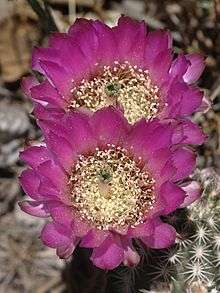Echinocereus fendleri
| Echinocereus fendleri | |
|---|---|
 | |
| Scientific classification | |
| Kingdom: | Plantae |
| (unranked): | Angiosperms |
| (unranked): | Eudicots |
| (unranked): | Core eudicots |
| Order: | Caryophyllales |
| Family: | Cactaceae |
| Subfamily: | Cactoideae |
| Tribe: | Pachycereeae |
| Genus: | Echinocereus |
| Species: | E. fendleri |
| Binomial name | |
| Echinocereus fendleri (Engelm.) Sencke ex J.N.Haage | |
Echinocereus fendleri is a species of cactus known by the common names pinkflower hedgehog cactus and Fendler's hedgehog cactus.
It grows in deserts and woodlands in the Southwestern United States and Northeastern Mexico.[1] It is most common in New Mexico.[2]
The taxonomy of the species is uncertain, with authors recognizing up to eight varieties.[2]
Description
Echinocereus fendleri has an erect oval or cylindrical stem, sometimes forming a clump of several spreading stem branches. The stem may reach 7.5 to 30 centimeters in maximum height. There are up to 16 spines per areole, generally in shades of brown and white, or white with a brown stripe.
The showy flower is most any shade of pink, from nearly white to deep maroon. It can be 11 centimeters long and wide, each tepal measuring up to 7 centimeters long. The fruit is red and a few centimeters long.[3]
The flesh of the plant is edible, and Native American groups consumed the stems and fruits.[2]
Varieties
One variety of this species, Echinocereus fendleri var. kuenzleri, Kuenzler's hedgehog cactus' (formerly Echinocereus kuenzleri), is rare and federally listed as an endangered species of the United States. When it was listed in 1979, there were only 200 known individuals of this variety remaining, all in the Sacramento Mountains of New Mexico. It was threatened with extinction by poachers, who removed many plants from the wild.
More populations have since been discovered. The US Fish and Wildlife Service has suggested it be downlisted to threatened status.[4] Kuenzler's hedgehog cactus differs from other varieties of the species by having large flowers, reaching 11 centimeters long and magenta in color, and white spines.[4]
References
- ↑ Echinocereus fendleri. The Nature Conservancy.
- 1 2 3 Echinocereus fendleri. US Forest Service Fire Ecology.
- ↑ Echinocereus fendleri. Flora of North America.
- 1 2 USFWS. var. kuenzleri Five-year Review. May 2005.
External links
| Wikimedia Commons has media related to Echinocereus fendleri. |
- USDA Plants Profile — Echinocereus fendleri
- Southwest Colorado Wildflowers
- Echinocereus fendleri Photo gallery

